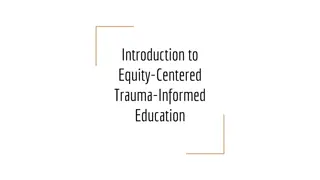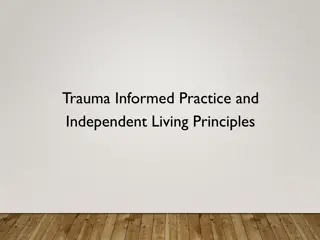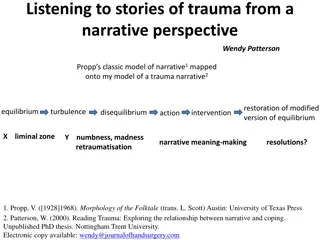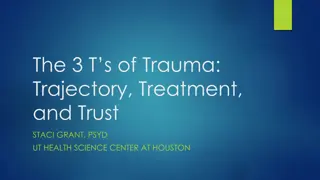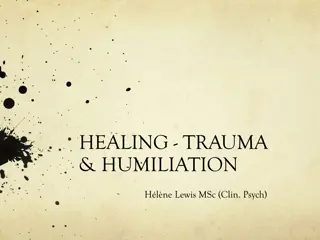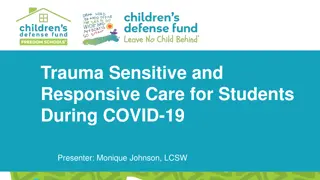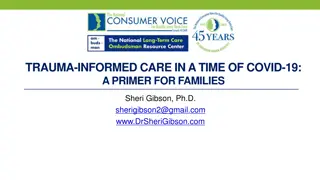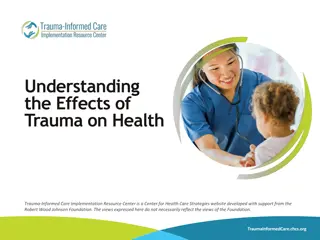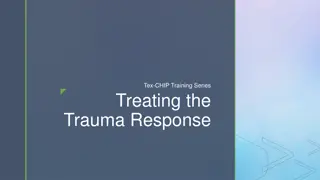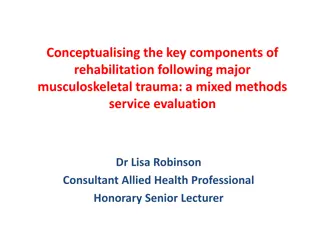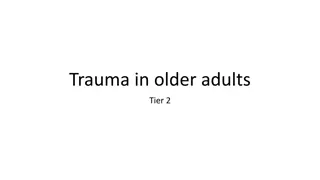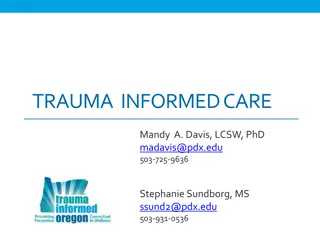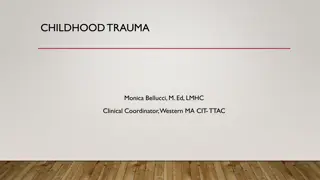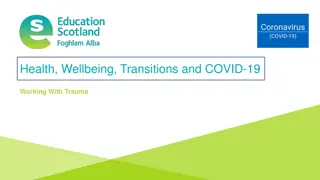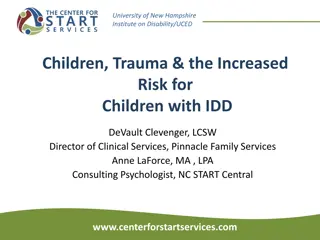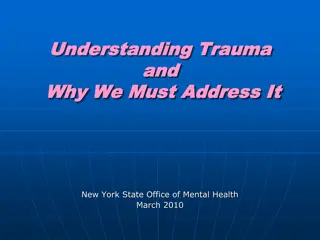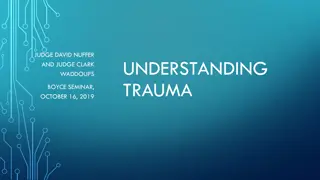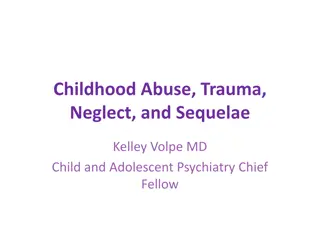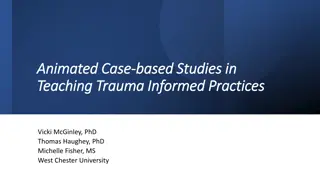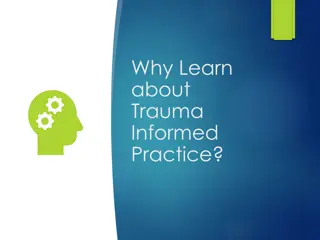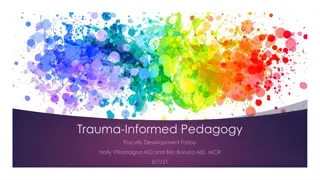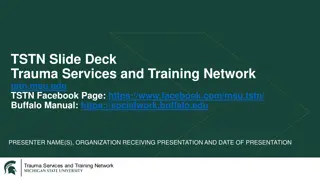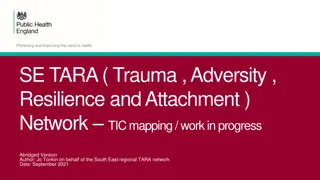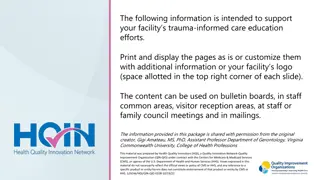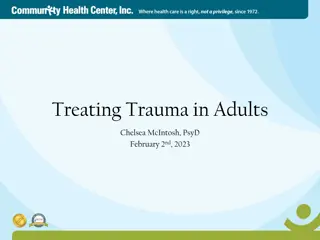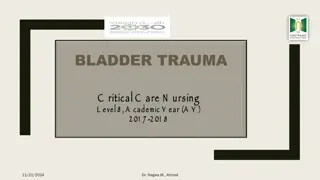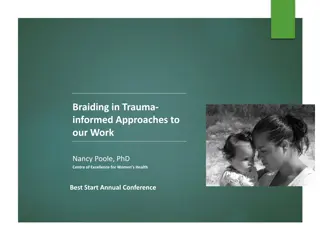Understanding OIG Audits for Trauma Payment Claims
Delve into the intricacies of OIG reviews of trauma payment claims, focusing on the potential impact on Medicare payments for trauma centers and providers. Learn about key issues investigated by the OIG, such as non-designated/verified trauma centers, using revenue codes, trauma team upgrades/downgr
1 views • 28 slides
Understanding Trauma-Informed Techniques on College Campuses
Exploring trauma and its impact on individuals, particularly college students, this presentation delves into recognizing trauma, signs of trauma on campuses, and the role of campus safety and police in addressing and supporting those affected by trauma. Highlighting the importance of empathy, unders
1 views • 22 slides
Equity-Centered Trauma-Informed Education Overview
Explore the fundamentals of Equity-Centered Trauma-Informed Education (ECTIE) including the definition of trauma, examples of potentially traumatic events, and strategies for creating awareness, taking action, and advocating for equity. Learn how to implement trauma-informed practices, address syste
2 views • 49 slides
Building a Trauma-Informed Workplace for Equitable Employment: USDA Symposium 2023
Explore the imperative of creating trauma-informed workplaces at the National Disability Employment Awareness Month Symposium hosted by USDA Target Center. The event sheds light on the prevalence of workplace trauma, its impact on mental health, and steps to advance access and equity. Gain insights
2 views • 36 slides
Pediatric Trauma Resources: Chest, Abdomen, and Pelvis Review
This guideline provides resources for the evaluation and management of chest, abdomen, and pelvic trauma in pediatric patients. It covers a range of topics including thoracic injuries, abdominal trauma evaluation, nonoperative management protocols, and guidelines for various pediatric injuries. The
5 views • 21 slides
Understanding Trauma-Informed Practice for Independent Living
Explore the dimensions and types of trauma, including single incident, complex, and developmental trauma, as well as intergenerational and historical trauma. Learn how coping patterns can be passed down through generations and discover the importance of Trauma-Informed Practice (TIP) to support indi
5 views • 15 slides
Understanding Trauma-Informed Safeguarding Practices
Trauma is the result of harmful or life-threatening events, impacting an individual's well-being. Trauma-informed practice acknowledges the effects of trauma on neurological, biological, and psychological development. The body responds to stress with physiological changes, including fight, flight, f
3 views • 8 slides
Understanding Trauma Narratives: A Narrative Perspective
Exploring trauma narratives through the lens of Wendy Patterson Propp's classic narrative model, this study delves into the restoration of equilibrium, the disruption of disequilibrium, and the intervention actions within the liminal zones of trauma narratives. It emphasizes narrative meaning-making
5 views • 5 slides
Understanding Trauma Bonding in Trafficked Youth
Trauma bonding is an emotional attachment that develops between abusers and victims, often seen in youth who have been trafficked. This bond can make it difficult for victims to break free from exploitation. Understanding trauma and its impact on the brain is crucial in supporting these individuals
0 views • 21 slides
Understanding the 3 Ts of Trauma: Trajectory, Treatment, and Trust
This comprehensive guide delves into the critical aspects of trauma - Trajectory, Treatment, and Trust. It covers the definition of trauma, PTSD symptoms, potentially traumatic events, trajectories of traumatic stress, and the impact of trauma on mental health. Explore the effects on behavior, biolo
0 views • 29 slides
Understanding Trauma and Healing: Insights from Neuroscience
Recent neuroscience findings based on the work of Professor Bessel van der Kolk shed light on how trauma affects the human organism. Traumatic experiences leave lasting legacies on individuals, families, and societies, impacting mental, emotional, and physical well-being. The profound changes trauma
0 views • 32 slides
Understanding Trauma-Sensitive Care for Students During COVID-19
In this presentation by Monique Johnson, LCSW, the importance of trauma-sensitive and responsive care for students during COVID-19 is emphasized. It discusses the impact of trauma, different types of trauma youth may experience, stress reactions, and protective factors. Participants are guided to co
0 views • 17 slides
Understanding Trauma-Informed Care During COVID-19
This primer by Dr. Sheri Gibson explores trauma-informed care in the context of COVID-19, emphasizing the multifaceted individual responses to trauma. It delves into the elements of trauma-informed care, the prevalence of trauma, and provides insights on recognizing and addressing trauma amidst the
0 views • 39 slides
Understanding the Effects of Trauma on Health: Insights from Trauma-Informed Care Implementation
Individual trauma and adverse childhood experiences can have lasting effects on mental, physical, social, and emotional well-being. The Trauma-Informed Care Implementation Resource Center provides valuable insights on defining trauma, examples of traumatic events, prevalence statistics, and types of
0 views • 11 slides
Understanding Trauma Response and Treatment in the US
Trauma is prevalent in the US, with unresolved reactions affecting development and relationships. Effective treatment like Cognitive Processing Therapy (CPT) is vital for well-being. Sources of trauma include threats to the body, environmental events, and relational trauma. Responses to trauma vary
0 views • 18 slides
Understanding Evaluation in Education
Evaluation in education is a comprehensive term that encompasses measurement, testing, and qualitative examination of student behavior. It involves both quantitative and qualitative descriptions, along with value judgments. Differentiating from mere measurement, evaluation provides a deeper analysis
0 views • 28 slides
Evaluation of Rehabilitation Components for Musculoskeletal Trauma
This evaluation focuses on the rehabilitation needs of individuals with major musculoskeletal trauma, aiming to identify, prioritize, and enhance services. The project involves generating ideas, sorting and rating statements, and mapping key components such as long-term support, therapy input, and e
0 views • 15 slides
Understanding Trauma in Older Adults: A Comprehensive Overview
Trauma in older adults is often under-recognized and under-treated. It can have lasting adverse effects on their well-being. Recognizing the signs, responding appropriately, and avoiding re-traumatization are crucial steps in supporting older adults who have experienced trauma. Triggers such as anni
4 views • 12 slides
Overview of Trauma Management in the Emergency Department
This summary file covers the key aspects of trauma management, including epidemiology of trauma, mechanisms of injury (penetrating and blunt), triage and severity scoring, primary survey with ABCDE approach, emergency department management per ATLS protocol, and adjuncts to primary survey. It emphas
0 views • 42 slides
Overview of Monitoring and Evaluation in the GEF
The Evaluation in the GEF and Training Module focuses on promoting accountability and learning within the Global Environment Facility (GEF) through monitoring and evaluation activities. The GEF Independent Evaluation Office plays a crucial role in assessing results, effectiveness, and performance of
0 views • 25 slides
Understanding Abdominal Trauma: Epidemiology, Mechanism, Evaluation & Management
Abdominal trauma is a significant concern, notably in road traffic accidents. Blunt abdominal trauma (BAT) accounts for a majority of cases, with injuries commonly affecting the spleen and liver. Various mechanisms of injury and evaluation techniques, including examination signs and lab tests, aid i
0 views • 12 slides
Understanding Trauma-Informed Care: Keys to Recognition and Sensory Perception
Trauma-Informed Care emphasizes acknowledging the widespread impact of trauma, recognizing its signs, integrating trauma knowledge into practices, and preventing re-traumatization. The care approach focuses on sensory perception, understanding brain behavior, and recognizing how trauma affects indiv
0 views • 31 slides
Understanding Childhood Trauma and Its Impact on Development
Explore the complexities of childhood trauma with Monica Bellucci, M.Ed., LMHC, as she delves into the identification of trauma, adverse childhood experiences (ACEs), types of abuse, and the effects on brain development. Gain insights on trauma-informed approaches and the importance of early interve
0 views • 33 slides
Understanding Trauma and Promoting Wellbeing in Educational Settings
Explore the impact of trauma on learners' physical and mental wellbeing, especially in the context of COVID-19. Learn about trauma types, good practices, and creating nurturing environments to support individuals affected by trauma. Discover how to apply trauma-informed approaches in educational set
0 views • 10 slides
Understanding Childhood Trauma and Its Impact on Children with IDD
Childhood trauma, defined as intense and overwhelming experiences causing harm to physical and emotional well-being, can have severe repercussions on children with Intellectual and Developmental Disabilities (IDD). This article discusses the concept of trauma, provides examples of traumatic experien
0 views • 45 slides
Evaluation of FME Zero Emission Neighbourhoods in Smart Cities
The mid-term evaluation process of FME Zero Emission Neighbourhoods in Smart Cities involves self-evaluation, partner evaluation, and panel evaluation. The procedure includes scientific review, evaluation by scholars, and innovation assessment. Key documents like self-reports, progress reports, and
1 views • 20 slides
Understanding Trauma: Why It Must Be Addressed - Insights from New York State Office of Mental Health
This presentation delves into the critical topic of trauma, defining it, exploring its prevalence, implications, and the differences between trauma-informed and trauma-insensitive systems. It emphasizes understanding trauma's impact, identifying core organizational elements for addressing it, and as
0 views • 36 slides
Understanding Trauma: Causes, Effects, and Healing
Explore the complexities of trauma through insights on the causes, effects, and healing processes. Delve into the impact of PTSD on the brain's attention patterns, common triggers of trauma, and the profound effects trauma can have on individuals. Discover how trauma manifests in hypervigilance, mem
0 views • 20 slides
Understanding Childhood Trauma and Its Impact on Mental Health
Childhood trauma, abuse, neglect, and their repercussions are crucial topics in child and adolescent psychiatry. The content delves into the definitions of trauma, child abuse, and related disorders, exploring their effects on individuals across the lifespan. It highlights the importance of recogniz
0 views • 44 slides
Transforming Education with Trauma-Informed Practices
Schools are now required to implement trauma-informed education to address Adverse Childhood Experiences (ACEs). This involves mandatory training for educators, emphasizing the recognition of trauma signs. Case-based learning is highlighted as a valuable method for preservice teachers to develop cri
0 views • 13 slides
Understanding Trauma, Addiction, and Their Interconnection
Experiencing trauma does not guarantee addiction, but research links trauma to addictive behaviors. Trauma, whether single, complex, or historical, can lead to substance use as a coping mechanism. Psychological trauma like ACEs, childhood maltreatment, and PTSD are significant factors. Co-morbidity
0 views • 12 slides
Understanding Trauma: Key Elements and Neurobiological Impact
Trauma-informed practice involves being aware of trauma's presence, understanding its effects on physical and emotional well-being, and working with trauma symptoms constructively. Trauma can arise from direct exposure, witnessing, or indirect experiences, affecting memory encoding and retrieval. Th
0 views • 23 slides
Trauma-Informed Supervision Practices and Principles
Explore the concept of trauma-informed care, its principles, and core schemas distorted by trauma. Learn how trauma-informed supervision supports staff experiencing trauma, promotes resiliency, and addresses secondary trauma effects. Discover guiding questions for meaningful conversations and provid
0 views • 17 slides
Exploring Trauma-Informed Pedagogy in Education
The content delves into Trauma-Informed Pedagogy, an emerging approach in education particularly relevant during the COVID-19 era. It discusses core principles, the link to trauma-informed care, and offers insights from a literature review. Key points include recognizing the impact of stress on lear
0 views • 17 slides
Understanding Trauma: Definitions, Prevalence, and Impacts
This presentation explores trauma basics, including definitions, ACES, risk and protective factors, resiliency, PTSD, cultural awareness, stereotypes, stigma, and trauma-informed approaches. It also delves into the prevalence of trauma, highlighting statistics on traumatic event exposure among colle
0 views • 7 slides
Understanding Trauma-Informed Care (TIC) and Resilience in the SE TARA Network
This work-in-progress document discusses the aims and objectives of the SE TARA Network in establishing a common language and approach to Trauma-Informed Care (TIC). It highlights strengths and limitations of unifying TIC responses, defines trauma and trauma-informed approaches, and outlines key pri
0 views • 10 slides
Understanding Trauma and Implementing Trauma-Informed Care
Explore the concepts of trauma, trauma-informed care, and the impact of traumagenic experiences on individuals with this comprehensive educational package. Learn about the sources of trauma, nervous system responses, and how to create a culture of trauma-informed care in your facility. Utilize the p
0 views • 7 slides
Recognizing and Treating Trauma in Adults: A Comprehensive Approach
This presentation focuses on assessing, distinguishing, and treating trauma in adults, emphasizing trauma-informed care principles. It discusses various treatment modalities and the importance of recognizing trauma in clients to provide effective care. The session aims to improve patient outcomes by
0 views • 35 slides
Understanding Bladder Trauma: Etiology, Pathophysiology, and Management
Bladder trauma commonly occurs due to pelvic trauma or surgical interventions, leading to injuries like contusion, intraperitoneal rupture, and extraperitoneal rupture. Dr. Nagwa M. Ahmed presents key elements of bladder trauma, including its etiology, pathophysiology, clinical presentation, diagnos
0 views • 16 slides
Understanding Trauma and Trauma-Informed Approaches in Practice
Exploring trauma and trauma-informed practice through a presentation by Nancy Poole, PhD, at the Best Start Annual Conference. The session delves into trauma's impact, the concept of historical trauma, and the integration of Indigenous and Western knowledge systems in research. It also discusses the
0 views • 46 slides


